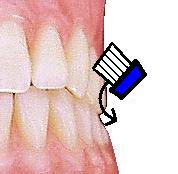FAQ
Below are some of the most frequently asked questions patients have about dentistry and oral health issues. If you have any other questions, or would like to schedule an appointment, we would love to hear from you.
- What is your payment policy?
- Are all dental offices the same?
- How much is a cleaning?
- How often should I have a dental exam and cleaning?
- Children and dentistry/orthodontics
- How can cosmetic dentistry help and improve the appearance of my smile?
- How can I tell if I have gingivitis or periodontitis (gum disease)?
- What should I do if I have bad breath?
- How often should I brush and floss?
- Why is it important to use dental floss?
- What type of toothbrush should I choose? Does it matter?
- What can I do about stained or discoloured teeth?
Q9: How often should I brush and floss?
A: Brushing and flossing help control the plaque and bacteria that cause dental disease.
Plaque is a film of food debris, bacteria, and saliva that sticks to the teeth and gums. The bacteria in plaque convert certain food particles into acids that cause tooth decay. Also, if plaque is not removed, it turns into calculus (tartar). If plaque and calculus are not removed, they begin to destroy the gums and bone, causing periodontal (gum) disease.
Plaque formation and growth is continuous and can only be controlled by regular brushing, flossing, and the use of other dental aids.
Toothbrushing - Brush your teeth at least twice a day (especially before going to bed at night) with a CDA approved extra soft bristle brush and toothpaste.

- Brush at a 45 degree angle to the gums, gently using a small, circular motion, ensuring that you always feel the bristles on the gums.
- Brush the outer, inner, and biting surfaces of each tooth.
- Use the tip of the brush head to clean the inside front teeth.
- Brush your tongue to remove bacteria and freshen your breath.
Electric toothbrushes are also recommended. They are easy to use and can remove plaque efficiently. Simply place the bristles of the electric brush on your gums and teeth and allow the brush to do its job, several teeth at a time.
Flossing - Daily flossing is the best way to clean between the teeth and under the gum line. Flossing not only helps clean these spaces, it disrupts plaque colonies from building up, preventing damage to the gums, teeth, and bone.
- Take 12-16 inches (30-40cm) of dental floss and wrap it around your middle fingers, leaving about 2 inches (5cm) of floss between the hands.
- Using your thumbs and forefingers to guide the floss, gently insert the floss between teeth using a sawing motion.
- Curve the floss into a "C" shape around each tooth and under the gum line. Gently move the floss up and away from the gum, cleaning the side of each tooth.
Floss holders are recommended if you have difficulty using conventional floss.
Rinsing - It is important to rinse your mouth with water after brushing, and also after meals if you are unable to brush. If you are using an over-the-counter product for rinsing, it’s a good idea to consult with your dentist or dental hygienist on its appropriateness for you.